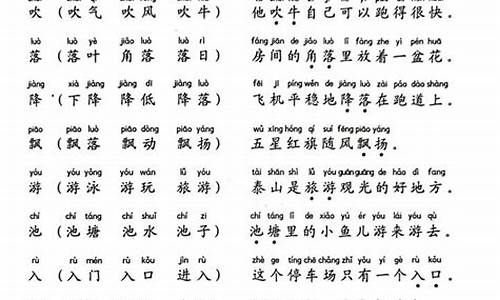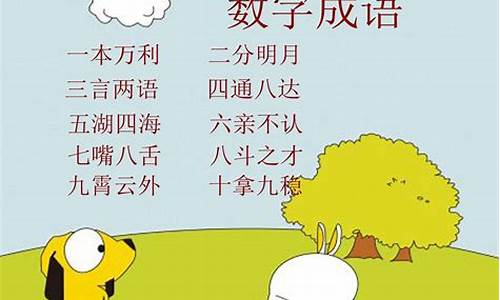张培基四字成语翻译_张培基四字成语翻译使用了什么方法
很高兴能够参与这个张培基四字成语翻译问题集合的解答工作。我将根据自己的知识和经验,为每个问题提供准确而有用的回答,并尽量满足大家的需求。
1.张培基英译散文赏析之《雾》
2.张培基英译散文赏析之《海上日出》
3.张培基翻译风格特点
4.张培基英译散文(10)——《匆匆》朱自清

张培基英译散文赏析之《雾》
《雾》
Fog
茅盾
Mao Dun
| 译文摘自张培基《英译中国散文选二》
雾遮没了正对着后窗的一带山峯。
The mountain peaks directly facing the back window of my room were veiled in fog.
要点:
1, 本句采用被动语态,突出施动者,也给人一种画面感~
2, 将“雾”译为fog,而非mist,因为后者指的是“薄雾”,fog 指“雾,雾气”, *** og指“烟雾”,haze则是指“雾霾”
综述:“雾”的表达有好多种,要选择最适合的一种~
我还不知道这些山峯叫什么名儿。我来此的第一夜就看见那最高的一座山的顶巅像钻石装成的宝冕似的灯火。那时我的房里还没有电灯,每晚上在暗中默坐,凝望这半空的一片光明,使我记起了儿时所读的童话。实在的呢,这排列得很整齐的依稀分为三层的火球,衬着黑魆魆的山峯的背景,无论如何,是会引起非人间的缥缈的思想的。
The names of these mountain peaks are still unknown to me. The first night when I was there I had seen the top of the highest mountain shining with lights like a precious crown set with diamond. As there was no electric light in my room
all I could do in the evening was sit quietly in the dark and fix my eYes on the midair radiance
which reminded me of the fairy tales I had read in my childhood. Indeed
the orderly array of lights shining in three indistinct tiers one above another against a background of dark mountain peaks could conjure up
without fail
visions of the ethereal.
要点:
1,“我还不知道这些山峯叫什么名儿”译为The names of these mountain peaks are still unknown to me.译者采用无灵主语,符合英文表达习惯,也避免了连续使用I 开头造成的句式上的重复。
2,“那时我的房里还没有电灯,每晚上在暗中默坐,凝望这半空的一片光明,使我记起了儿时所读的童话。”中的“没有电灯”与后文有隐含的因果关系,因此译为As there was no electric light in my room
all I could do in the evening was sit quietly in the dark and fix my eyes on the midair radiance
which reminded me of the fairy tales I had read in my childhood.
3,“这排列得很整齐的依稀分为三层的火球”译为the orderly array of lights shining in three indistinct tiers one above another,中文多层定语,翻译时要分别前置和后置~
综述:
注意本段多层定语的翻译~
但在白天看来,却就平凡得很。并排的五六个山峯,差不多高低,就只最西的一峯戴着一簇房子,其余的仅只有树;中间最大的一峯竟还有濯濯地一大块,像是癞子头上的疮疤。现在那照例的晨雾把什么都遮没了;就是稍远的电线杆也躲得毫无影踪。
In the daytime
however
it was all prosaic. The five or six peaks forming the front row were about the same height. The westernmost one had on top a cluster of houses while the rest were topped by nothing but trees. The highest one in the middle had on it a large piece of barren land
like the scar on a favus-infected human head. Now
as usual
the morning fog had shut out everything pletely
including the not-too-distant wire poles.
要点:
1,“并排的五六个山峯”多重定语,分前后,其中表状态的“并排的”可以后置,译为The five or six peaks forming the front row
2,“中间最大的一峯”中表位置的“中间“可以后置译为 The highest one in the middle
3,“濯濯” 指山坡上光秃秃的样子,译为barren land
4,“癞子头”是指黄廯感染的头,译为favus-infected human head
4,文中出现多次表示“遮盖”的词,译者根据不同语境,分别用了veil
shut out
shroud
obliterate作同义替换,记得总结哦
综述:
本段重点依旧在于多重定语的翻译,表位置和状态的定语可以后置译为状语~
渐渐地太阳光从浓雾中钻出来了。那也是可怜的太阳呢!光是那样的淡弱。随后它也躲开,让白茫茫的浓雾吞噬了一切,包围了大地。
Gradually
however
the sun managed to show through the dense fog. Yet how pitifully pale it looked! And soon it disappeared altogether
leaving the white thick fog to engulf everything and shroud mother earth.
要点:
1,“钻”即“从…中显露”译为show through,在遇到不会翻或找不到对应词的动词时,我们可以用一个词组或短语将此动作描述出来~
2
” 那也是可怜的太阳呢!光是那样的淡弱”意为“太阳的光线是那样弱,真是可怜”,合译为how pitifully pale it looked!
综述:
注意对于不熟悉的动词的翻译以及本段的合译~当然还是要尽量丰富自己的词汇,毕竟如果过多使用词组和短语也会使句子变的冗杂~
我诅咒这抹煞一切的雾
I hate the all-obliterating fog!
我自然也讨厌寒风和冰雪。但和雾比较起来,我是宁愿后者呵!寒风和冰雪的天气能够杀人,但也 *** 人们活动起来奋斗。雾,雾呀,只使你苦闷,使你颓唐阑珊,像陷在烂泥淖中,满心想挣扎,可是无从着力呢!
Of course I hate biting wind and icy snow too. But when they are pared with fog
I would rather have the former than the latter! Though biting wind and icy snow sometimes be a killer
yet they can also spur people on to greater efforts. O you fog! You plunge us into a state of depression and dejection
from which we struggle in vain to extricate ourselves as if we were bogged down in a mire.
要点:
1,“寒风和冰雪的天气能够杀人“译为biting wind and icy snow sometimes be a killer,其中”be a killer”比“kill people”更加简洁生动~
2,“雾,雾呀,只使你苦闷,使你颓唐阑珊,像陷在烂泥淖中,满心想挣扎,可是无从着力呢!”译为O you fog! You plunge us into a state of depression and dejection
from which we struggle in vain to extricate ourselves as if we were bogged down in a mire.
① 原文是一个长感叹句,译者将主要的感叹词提前,后面译为陈述句,方便行文
② “使…”译为plunge *** into
③ “陷在“译为bog down在英语行文中”像…”一般出现在句末或句中,此处为了意思流畅,将其置于句末
④ 译者巧妙地将“满心想挣扎,可是无从着力”和“烂泥谭”用一定语从句串了起来译为from which we struggle in vain to extricate ourselves,其中“无从着力”即“徒劳地”译为in vain,来修饰struggle“挣扎”
综述:注意本段用定从串联起的合译,合译最主要的就是找主语,找动词,找关系~
傍午的时候,雾变成了牛毛雨,像帘子似的老是挂在窗前。两三丈以外,便只见一片烟云——依然遮抹一切,只不是雾样的罢了。没有风。门前池中的残荷梗时时忽然急剧地动摇起来,接着便有红鲤鱼的活泼泼的跳跃划破了死一样平静的水面。
About noon the fog turned into a fine misty rain like a curtain hanging still at the window. Some 30 feet away
a cloud of misty vapor prevailed
blotting out everything. The air was windless. Every now and then
the withered lotus stems in the pond in front of my door gave a sudden violent jerk as a red carp was seen splashing briskly out of the water to break the death-like silence.
要点:
1,“只不是雾样的罢了”译为misty放在vapor(水雾)之前即可,准确简洁
2,“门前池中的残荷梗时时忽然急剧地动摇起来,接着便有红鲤鱼的活泼泼的跳跃划破了死一样平静的水面。”中“鲤鱼的跳跃”与“荷梗的摇动”是隐含的因果关系~用as
综述:分句间的关系大部分为因果或让步~
我不知道红鲤鱼的轨外行动是不是为了不堪沉闷的压迫?在我呢,既然没有杲杲的太阳,便宁愿有疾风大雨,很不耐这愁雾的后身的牛毛雨老是像帘子一样挂在窗前。
I wonder if the red carp’s aberration was due to its impatience with the unbearably oppressive status quo. As for me
failing a bright sunshine
I would rather have a violent storm. I cannot endure the fine misty rain which came in the wake of the gloomy fog to linger like a curtain hanging still at the window.
要点:
1,“红鲤鱼的轨外行动”中的“轨外”意即“反常”或“异常”,故全文为the red carp’s aberration,意同the red carp’s abnormal behavior
2
” 既然没有杲杲的太阳”意为“如无阳光灿烂”,译为failing a bright sunshine,其中failing 为介词,作“如果没有”解
3,“愁雾的后身的牛毛雨”也是多层定语,其中“愁雾的后身”即“伴随着愁雾而来的”可以后置,译为the fine misty rain which came in the wake of the gloomy fog
综述:
本文句式基本无难点,主要掌握多层定语和回顾分句合译技巧~
张培基英译散文赏析之《海上日出》
生命
Life
何为
He Wei
| 译文摘自张培基《英译中国散文选二》
如果回归自然,各有不同的方式,后人总是尊重前人最后一次选择。一位朋友偶然讲起一件事,有如一篇小小说,听者动容。
There are various ways of returning to nature
but people generally respect the last wish made by their parents towards their journey’s end. A friend of mine incidentally related to me the following occurrence which
like a little story
is very touching:
要点:
1,“前人最后一次选择”译者按”父母的临终愿望“之意译为the last wish made by their parents towards their journey’s end,其中one’s journey’s end意为“临终,生命的尽头”也可译为the last wish made by their parents towards the end of their life journey
2
“一位朋友偶然讲起一件事”译为A friend of mine incidentally related to me the following occurrence,其中relate 意为“讲述”其同义词有recount,recourse
speak of,occurrence指“发生的事情”比thing更加高端啊有木有~
3,“听者动容“即”令听者动容“或”令人动容“=touching
在新开发的丛林里,一条蜿蜒的小径上,一个衣着素色的女人踽踽独行,径直走向林子里的一棵树。这里许多树大小参差不一,有的移植不久,不过都长得很快。在一个时期内,都挺直有神。新生的树叶嫩绿有生机。当然,有人专门护理这些纪念树。
In a newly opened-up forest
a quietly dressed woman walked all by herself on a winding path straight towards one of the trees. There were many trees of varying sizes
and some had just been transplanted
but all were shooting up fast
standing straight and stout and covered with light green young leaves. Evidently
some people had been put in charge of these memorial trees.
要点:
1,“在新开发的丛林里,一条蜿蜒的小径上,一个衣着素色的女人踽踽独行,径直走向林子里的一棵树。“本句虽然是四个散句,表达的却是一连串的动作,因此可以调整顺序后将其整合为” 一个衣着素色的女人独自沿着蜿蜒的小径走向一棵树“译为In a newly opened-up forest
a quietly dressed woman walked all by herself on a winding path straight towards one of the trees.
2,“衣着素色的“译为a quietly dressed,此处的quiet意指”颜色素净,不显眼“;”踽踽独行“即”独自行走“=walked all by herself
3,shoot up意为“上冒,喷出,猛长“=spring up
更加生动形象地表现出树木那富有生机的生长状态~是一个值得借鉴的好词,
4,“有人专门护理这些纪念树“译为some people had been put in charge of these memorial trees。此处”专门护理“宜理解为”专门负责照顾这些树“,也可译为some person had been specially assigned to take good care of the memorial trees
综述:类似于shoot up这种生动形象的词我们之前也见过不少,比如put forth
sprout up/out~
不知多少年来,这个女人总是带着一束鲜花默默地置于树根旁,然后仰起头来,对着树身凝视,翕动着她独有的小小嘴唇,既像独语,又像倾诉。她退后一步,打量她这树高了多少,细心地除去树下斑斑驳驳的落叶,向这颗移植多年的树倾身拥抱,亲了一下,轻轻摩挲树皮的皱纹,如同面对一个有生命的躯体。不久,她依依不舍的转身离去,消失在暮色渐浓的秋天最后一抹余晖里。
As she had been doing for we don’t know how many years
the woman stood silently beside the tree with a bunch of fresh flowers in her hand. She raised her head to fix her eyes on the tree and kept moving her unique *** all lips as if she were soliloquizing or sharing her innermost feelings with someone. She took a step back to assess how much the tree had grown in height and softly removed the mottled fallen leaves under it. She bent forward to hug and kiss the tree that had been transplanted many years before
and gently stroked its wrinkled bark as if it were something alive. Then she reluctantly turned round and left
vanishing into the last rays of an autumn day in the deepening dusk.
要点:
1,“不知多少年来“译为As she had been doing for we don’t know how many years
其中we don’t know how是插入语,用以表达原文的”不知“此从句也可译为”她这样做已经许多年了“即As had always been the case for many years或as she had been doing this for many years~在《我坐了木船》中也有类似表述——“跑了不知多少趟,总算有眉目了”译为After making you don't know how many visits
there eventually appear signs of positive oute.其中的you don’t know how也是插入语,修饰many。
2,“翕动“即”不断地张合“故译kept moving
3,“依依不舍“一般都用reluctant来翻,如It the time to go back. We were fascinated by the scenery and reluctant to leave.该返回了,我们被这景色深深吸引住了,不愿离去。
综述:本段有很多文学性较强的词如“独语“”倾诉“”斑斑驳驳的“摩挲”“ 翕动”都是我们需要积累的哦~还是那句话:文学性很重要的一个体现就是在选词用词上~
一阵秋风吹过,树叶沙沙地响动,仿佛隐秘的私语。女人顿时回过身来,惟有她才能听懂私语的全部含意。于是喃喃自语向大树告诉。含着泪,走向她的归途。年复一年,小径上的女人孤独的背影,显得越来越苍老了。
At a sudden gust of the autumn wind
the tree rustled like it was whispering secretly and the woman
being the only person capable of understanding the full implications of the whisper
immediately turned round. Then
after mumbling a few words to the tree
she said goodbye to it and set out on her way home with tears in her the years went by
the woman
a regular solitary visitor on the path
became older and older.
要点:
1,”一阵秋风吹过“即”秋风起“或”起了一阵秋风“,故译At a sudden gust of the autumn wind,其中at的含义是”由于“”作为对…的反应“
2,“树叶沙沙地响动,仿佛隐秘的私语“译为the tree rustled like it was whispering secretly and the woman.”沙沙地响动“=rustle
简洁生动~拟声词在文学翻译中的作用也是应该引起重视的~
3,“.惟有她才能听懂私语的全部含意“其实隐含了”因为“这层关系,因此译为being the only person capable of understanding the full implications of the whisper
4,“小径上的女人孤独的背影,显得越来越苍老了“如果直接译为”背影变得苍老“会引起外国读者的困惑,因此可以按照”常见于小径上的那个孤独女人,显得越来越苍老了“,译为the woman
a regular solitary visitor on the path
became older and older.
综述:介词,拟声词,显示了译者扎实的语法功底和语言功底,惟有不断积累和运用才能成就的事业~
若干年后,这棵树长得更高大了,树冠缀满葱茏的树叶。它屹立在这片土地上,风吹来,满树充满生命的绿色更繁茂了。它对着苍穹,仰望太阳、月亮和星星的运行,与大自然亲密无间连成一片。
Several years later
the tree became even taller and was crowned with verdant foliage. It stood erect and became more and more luxuriantly green in the wind. It looked up at the firmament to watch the motions of the sun
moon and stars and thus merged itself with Mother Nature.
要点:
1,“风吹来“也是采用介词+名词的形式译为in the wind,置于句中,凸显句式的简洁~
2
”缀满“=be crowed with=be filled with,crowed 较filled更加生动
3,“与…连成一片”=merge oneself with
又过了些时候,靠近大树旁出现了一棵新移植的小树。小树很壮硕,也很安静。随着岁月递增,年长日久,大树和小树埋在泥土下的根茎错节,相互交织。两棵树下各埋着一个精致的小木盒,木盒里的骨灰,逐渐化为树根下的有机肥,融入树身内。两个老者相继以这样的方式回归自然,在大自然的怀抱中,生命得以延续。树上每一片小绿叶都蕴含着绿色的希望。这是真的,是一首歌颂树葬的诗篇。不用问他们是谁,是谁,就是谁。
Another period of time afterwards
there appeared close to it a newly transplanted *** all tree. It was robust and quiet. With the passage of time
the roots of the o trees had bee ined together. They each had a delicate *** all wooden cinerary casket buried underneath them. The ashes in the caskets had gradually turned into anic fertilizer passing into the trees trunks by way of the roots. The o elderly persons had successively chosen the same way of returning to nature so as to have life prolonged in the bosom of nature. Each tender leaf in the trees was pregnant with green hope. It’s a true story. It’s a poem singing the praises of tree burial. No need to identify the o elderly people though. It could be any person.
要点:
1,“根茎错节,相互交织”即“树根相互盘绕”即the roots of the o trees had bee ined together.
2
” 两棵树下各埋着一个精致的小木盒”译为They each had a delicate *** all wooden cinerary casket buried underneath them. have done表被动~
3,“木盒里的骨灰,逐渐化为树根下的有机肥,融入树身内”即“木盒里的骨灰,逐渐化为有机肥,,通过树根,进入树身”译为The ashes in the caskets had gradually turned into anic fertilizer passing into the trees trunks by way of the way of 已经粗线好多次了意同于through
4,“是谁,就是谁”即“可能是任何一个人”,译为It could be any person
综述:注意本段中式散句的翻译,有些句子直译会引起困惑,需要译者把握及整合其具体意思而后进行翻译~本篇文章短小而有有味道,文字清新且富有诗意,无论是赏析还是拿来做练习都是一种享受~
张培基翻译风格特点
海上日出
Sunrise at Sea
巴金
Ba Jin
| 译文摘自张培基《英译中国散文选二》
为了看日出,我常常早起。那时天还没有大亮,周围非常清静,船上只有机器的响声。
I would often get up early to watch the sunrise when it was not yet quite light and all was quiet except for the droning of the ship engine.
要点:
本段重点在于合译,译者增用 了when
and
except for几个连接词 ,把汉语表达的意思串联了起来
表达的逻辑之美由此而生 。
天空还是一片浅蓝,颜色很浅。转眼间天边出现了一道红霞,慢慢地在扩大它的范围,加强它的亮光。我知道太阳要从天边升起来了,便不转眼地望着那里。
The sky was pale with a bluish hue. Soon a streak of pink dawn broke over the horizon,expanding gradually and being brighter and brighter. Knowing that the sun was about to rise
I had my eyes fixed on the distant edge of the sea.
要点:
1,“还没有大亮”=be not quite light,在《看月》中,有个“没有‘断黑’”= is not yet quite dark,“大亮”“断黑”都是程度副词+形容词的结构,通常用quiet+adj结构
2,“机器的响声”译为the droning of the ship engine.。“机器”这里指轮船上的steam engine
即蒸汽发动机,不宜译为macine.另外“响声”译为droning
表示机器的单调低沉的嗡嗡响声,较单纯的sound更有形象感
3,“浅蓝”=bluish,意为“带点蓝的,浅蓝色的”, -ish这个后缀表示”带…性质的,稍…的“,在《离别》和《杜鹃》中,我们也见到过此类构词法,这类表示颜色的词大家要注意,因为文学作品中出于细节刻画的需要,会将颜色描写得十分具体,翻译时也要注重选词的准确和美感哦~
4,“天边”是指海天交接之处,即“地平线”,译为the horizon,之后的“那里”文中处理为the distant edge of the sea
避免了重复
5,“一道红霞”也可译为a streak of rosy dawn或a rosy streak of dawn
综述:
本文是一篇写景短文,文字简洁朴素,细节化的描写使得文章绘声绘色,因此文章虽短,但由于细节较多,所以也不是很好译哦
果然过了一会儿,在那个地方出现了太阳的小半边脸,红是真红,却没有亮光。这个太阳好像负着重荷似的一步一步、慢慢地努力上升,到了最后,终于冲破了云霞,完全跳出了海面,颜色红得非常可爱。一刹那间,这个深红的圆东西,忽然发出了夺目的亮光,射得人眼睛发痛,它旁边的云片也突然有了光彩。
As expected
the sun soon appeared revealing half of its face
which was very red but not bright. It kept rising laboriously bit by bit as if weighted down with a heavy burden on its back until,after breaking through the rosy clouds ;it pletely emerged from the sea aglow with a lovely red. Then,before I knew it
the dark red orb began to shine blazingly
dazzling my eyes until they stung and all of a sudden lighting up the surrounding cloud.
要点:
1,“这个太阳好像负着重荷似的一步一步、慢慢地努力上升…”译为It kept rising laboriously bit by bit as if weighted down with a heavy burden on its back…其中laboriously 包含“慢慢地”和“努力”两重意义,它还是 一个多音节词 ,有意 地延 长 阅读 的时间 , 让 读者在 阅读 中真切 地感 受 日出的缓 慢过程,本句用了拟人手法,而译文的laboriously,weighted down with等词,也很好地表现了原文的修辞意
2,“一刹那间,这个深红的圆东西…”译为before I knew it
the dark red orb…,其中before I know it (或before I know where I was
before I was aware of it)在此意为“一刹那间”
此处译者并没有译为in the inkling of an eye
或者soon
3,“圆东西”译为orb,较round thing更加形象~
4,“颜色红得非常可爱”即“发出可爱的红光”译为be aglow with a lovely red
aglow意为“发亮的,发红的”
5,”射得人眼睛发痛“译为dazzling my eyes until they stung
其中until在此意为”以至于…”
6
” 它旁边的云片也突然有了光彩”为了避免再起一句,译者转换了主语与前句进行了合译,原文中几个小分句都围绕着“ 深红的圆东西” 这个 中心点,因此在翻译时,把 它作为主语 , 再运用 两个并 列 的现在 分词短语 把 语 意融 合 在一 起 ,结 构紧凑 、 意思连贯 , 同时也符合 英语 “ 头轻 尾重 ” 的表达习惯
综述:
本文最突出的特点就是拟人手法的运用,一般翻译时会通过动词,副词,从句的使用,尽量将其“拟人”的意思译出来~另外,注意本段人性化动词的灵活使用,例如“跳出”译为emerged from
有时太阳走进了云堆中,它的光线却从云里射下来,直射到水面上。这时候要分辨出哪里是水,哪里是天,倒也不容易,因为我就只看见一片灿烂的亮光。
Sometimes,hidden by the clouds
the sun noheless shed its rays straight onto the sea water
making it difficult for me to distinguish beeen the sky and the sea because what I saw in front of me was nothing but a wide expanse of brilliant light.
要点:
1,“有时太阳走进了云堆中”此处译者为了与下文照应,采用了主动转被动的手法~此句也可以理解为以“太阳”为主语的多动词句,“射出光线”为主要动词,“走进云堆”是次要动词,译为过去分词形式,至于句首~
2,”射到水面上“译为shed rays onto the sea,其中shed 此处意为”洒“
3,此句 译 文 中有 3处 使 用 了 头 韵 : sun/ shed / straight /seawater 、 difficult和distinguish、 s k y 和 s e a 。体现了散文的美感,读起来也是朗朗上口滴~
4,the sun noheless shed its rays straight onto the sea water中 , 将 原 文 “ 光线从云里射 下来 ”“ 直射到水面上 ” 两个动作合译,读起来一气呵成,流畅自然~后面直接用making连接两个句子,也体现了原文的简洁
有时天边有黑云,而且云片很厚,太阳出来,人眼还看不见。然而太阳在黑云里放射的光芒,透过黑云的重围,替黑云镶了一道发光的金边。后来太阳才慢慢地冲出重围,出现在天空,甚至把黑云也染成了紫色或者红色。这时候发亮的不仅是太阳、云和海水,连我自己也成了明亮的了。这不是很伟大的奇观么?
Sometimes
with thick layers of dark clouds hanging in the sky
the sun was hardly visible to the naked eye. But its radiance managed to show through the dark clouds to edge them with golden lace. Then
after gradually breaking through the tight encirclement
it came into full view and even dyed the dark clouds purple or scarlet. At the moment
apart from the sun,the clouds and the seawater
I too was 't that a marvelous spectacle?
要点:
1,“太阳出来人眼还看不见” 非 人称 主语 使 折射 一 定 生 命 内涵 的动 词 被 “ 挪 用 ”于不具 生命 的主语 , 这样 的句 式 就 自然 而然 地 抹 上了拟人色彩。译为“ t h e s u n w a s h a r d l y v i s i b l e t o t h e n a k e d e y e ” , 符合英语行文。而且 , 把太阳赋与人性 ,以非人称主语替代人称主语 , 表达顿趋简洁 , 而且显 得生动活泼
2,“透过黑云”此处译为managed to show through the dark clouds,用perate也可以,从上文的emerge到这里的manage to do,译者运用大量人性化的动词,将原文的“拟人化”的手法表现得淋漓尽致~
3,scarlet(绯红,猩红),本段乃至全文对于颜色的描写都非常细致,值得借鉴和总结~
4,“这时候发亮的不仅是太阳、云和海水,连我自己也成了明亮的了。”译为At the moment
apart from the sun,the clouds and the seawater
I too was luminous. 是作者借景抒情,不知不觉地融入到自然环境当中 ,情和景 在此刻完全交融在一起了。” 译者刻意调整句子重心,将这种 递进关系传神地传达给了读者 ,主次分明,突出此时此“ 我 ” 的融情于景 。
综述:本文简约而不简单,不论是原文还是译文,写得都是极美极美的~注意译者在选词,结构,意境等各方面对于“美”体现~
张培基英译散文(10)——《匆匆》朱自清
张培基主张“忠实通顺”的翻译观。张培基先生是我国著名的翻译家、教育家。 所谓忠 实,首先指“忠实于原作的内容,译者必须把原作的内容完整而准确地表达出来,不得 有任何篡改、歪曲、遗漏、阉割或任意增删的现象。 ”
其次,忠实还指“保持原作的风 格——即原作的民族风格、时代风格、语体风格、作者个人的语言风格等。 译者对原作的风格不能任意破坏和改变,不能以译者风格代替原作风格。 ”所谓通顺,“即指译文必 须通顺易懂,符合规范。 ”?
这种翻译理念的指引,再加上张培基先生做中国现代散文 英译的目的——他在《英译中国现代散文选》(第一辑)前言中说:“我断断续续译了一 些短文, 一是为消遣,二是出于对英文和散文的爱好,三是为了向国外介绍一些优秀 的中国现代散文作品。
匆匆朱自清
燕子去了,有再来的时候;杨柳枯了,在再青的时候;桃花谢了,有再开的时候1。但是,聪明的,你告诉我,我们的日子为什么一去不复返呢?——是有人偷了他们罢:那是谁?又藏在何处呢?是他们自己逃走了罢:现在又到了那里呢2?
我不知道他们给了我多少日子3;但我的手确乎是渐渐空虚了4。在默默里算着,八千多日子已经从我手中溜去5;像针尖上一滴水滴在大海里,我的日子滴在时间的流里,没有声音,也没有影子。我不禁头涔涔而泪潸潸了6。
去的尽管去了,来的尽管来着;去来的中间,又怎样地匆匆呢?早上我起来的时候,小屋里射进两三方7斜斜的太阳。太阳他也有脚啊,轻轻悄悄地挪移8了;我也茫茫然跟着旋转。于是——洗手的时候,日子从水盆里过去;吃饭的时候,日子从饭碗里过去;默默时,便从凝然的双眼前过去。我觉察他去的匆匆了,伸出手遮挽时,他又从遮挽着的手边过去,天黑时,我躺在床上,他便伶伶俐俐在从我身上跨过,从我脚边飞去了。等我睁开眼和太阳再见,这算又溜走了一日。我掩着面叹息。但是新来的日子的影儿又开始在叹息里闪过了。
在逃去如飞的日子里,在千门万户的世界里的我能做些什么呢?只有徘徊罢了,只有匆匆罢了;在八千多日的匆匆里,除徘徊外,又剩些什么呢?过去的日子如轻烟,被微风吹散了,如薄雾,被初阳蒸融了;我留着些什么痕迹呢?我何曾留着像游丝样的痕迹呢?我赤裸裸来到这世界,转眼间也将赤裸裸的回去罢?但不能平的9,为什
么偏要白白走这一遭啊?
你聪明的,告诉我,我们的日子为什么一去不复返呢?
Transient Days
Zhu ziqing
If swallows go away, they will come back again. If willows wither, they will turn green again. If peach blossoms fade, they will flower again. But, tell me, you the wise, why should our days go by never to return? Perhaps they have been stolen by someone. But who could it be and where could he hide them? Perhaps they have just run away by themselves. But where could they be at the present moment?
I don’t know how many days I am entitled to altogether, but my quota of then is undoubtedly wearing away. Counting up silently, I find that more than 8000 days have already slipped away through my fingers. Like a drop of water falling off a needle point into the ocean, my days are quietly dripping into the stream of time without leaving a trace. At the thought of this, sweat oozes from my forehead and tears trickle down my cheeks.
What is gone is gone, what is to come keeps coming. How swift is the transition in between! When I get up in the morning, the slanting sun casts two or three squarish patches of light into my small room. The sun has feet too, edging away softly and stealthily. And, without knowing it, I am already caught in its revolution. Thus the day flows away through the sink when I wash my hands; vanishes in the rice bowl when I have my meal; passes away quietly before the fixed gaze of my eyes when I am lost in reverie.
Aware of its fleeting presence, I reach out for it only to find it brushing past my outstretched hands. In the evening, when I lie on my bed, it nimbly strides over my body and flits past my feet. By the time when I open my eyes to meet the sun again, another day is already gone. I heave a sigh, my head buried in my hands. But, in the midst of my sighs, a new day is flashing past.
Living in this world with its fleeting days and teeming millions, what can I do but waver and wander and live a transient life? What have I been doing during the 8000 fleeting days except wavering and wandering? The bygone days, like wisps of smoke, have been dispersed by gentle winds, and, like thin mists, have been evaporated by the rising sun. What traces have I left behind? No, nothing, not even gossamer-like traces. I have come to this world stark naked, and in the twinkling of an eye, I am to go back as stark naked as ever. However, I am taking it very much to heart: why should I be made to pass through this world for nothing at all?
O you the wise, would you tell me please: why should our days go by never to return?
注释:
本文是朱自清的早期散文,写于1922年7月28日。文章充满诗意,对时光的消失深表感叹和无奈,流露出当时青年知识分子的苦闷和忧伤情绪。
(1) 原文开头三个句子结构类似,译文采用三个相应的句式,力求形似。同时,每句均以if从句为首,使人想起英国诗人雪莱(Shelley)的名句If Winter comes, can Spring be far away,有助于烘托原文的韵味。
(2) “现在又到了那里呢”译为But where could they be at the present moment,其中at the present moment等于now,也可用at the moment或at the moment in time等表达。
(3) “我不知道他们给了我多少日子”译为I don’t know how many days I am entitled to altogether,其中entitled to相当于qualified for,作“能有……”或“有权得到……”解。此句也可译为I don’t know how many days been given to live。
(4) “但我的手确乎是渐渐空虚了”不宜逐字直译,现以意译法处理:but my quota of them is undoubtedly wearing away,其中quota of them的意思是“一定数额的日子”,也即“寿命的预期数额”。也可用my allotted span 代替my quota of them。
(5) “八千多日子已经从我手中溜去”译为more than 8000 days have already slipped away through my fingers,其中to slip away through one’s fingers是英语习语。
(6) “我不禁头涔涔而泪潸潸了”的译文中添加了At the thought of this(一想到这儿),承上启下,原文虽无其字而有其意。
(7) “两三方”译为two and three squarish patches,其中squarish的意思是“似方形的”比square模糊些,似较可取。
(8) “挪移”在此有“慢慢离开”的含义,现以英语短语动词(phrasal verb) to edge away表达。注意原文第三段中若干表示动作的词语在译文中均挑选恰当的英语短语动词表达,效果较好。如:“从……(双眼前)过去”译为to pass away before…;“伸出手遮挽……”译为to reach out for…;“从……(手边)过去”译为to brush past…;“从……(身上)跨过”译为to stride over…; “从……(脚边)飞去了”译为to flit past…;“闪过去了”译为to flash past。
(9) “不能平的”意即“为之耿耿于怀”或“为之想不开”,现译为Iam taking it very much to heart,其中to take…to heart是英语成语,作“为……烦恼”或“为……想不开”解。
好了,今天关于“张培基四字成语翻译”的话题就讲到这里了。希望大家能够对“张培基四字成语翻译”有更深入的认识,并从我的回答中得到一些启示。如果您有任何问题或需要进一步的信息,请随时告诉我。
声明:本站所有文章资源内容,如无特殊说明或标注,均为采集网络资源。如若本站内容侵犯了原著者的合法权益,可联系本站删除。












